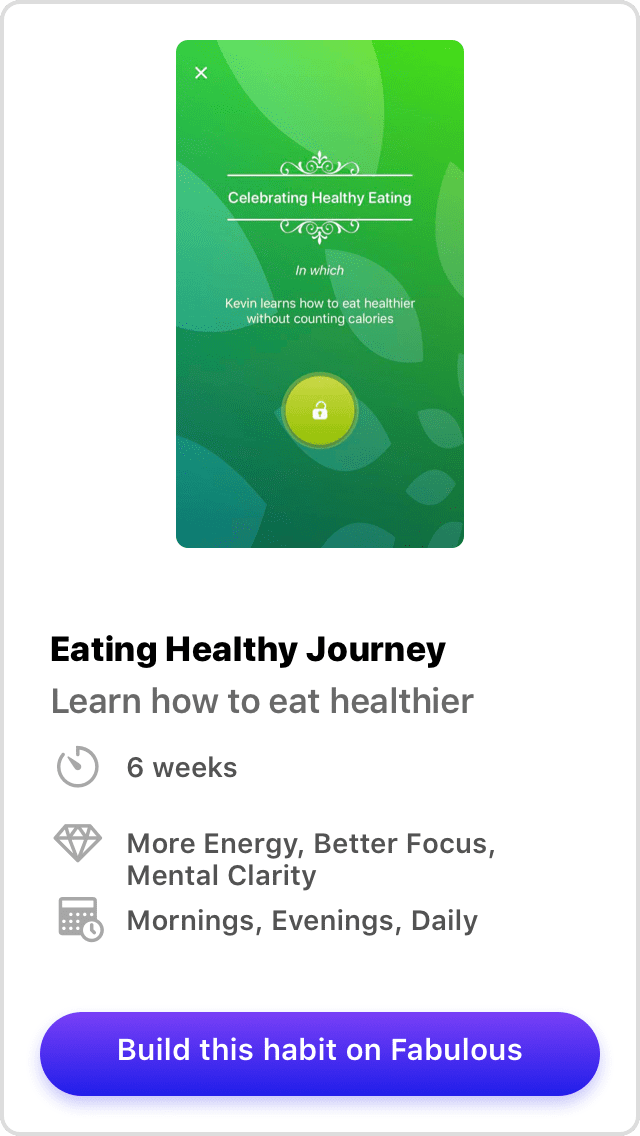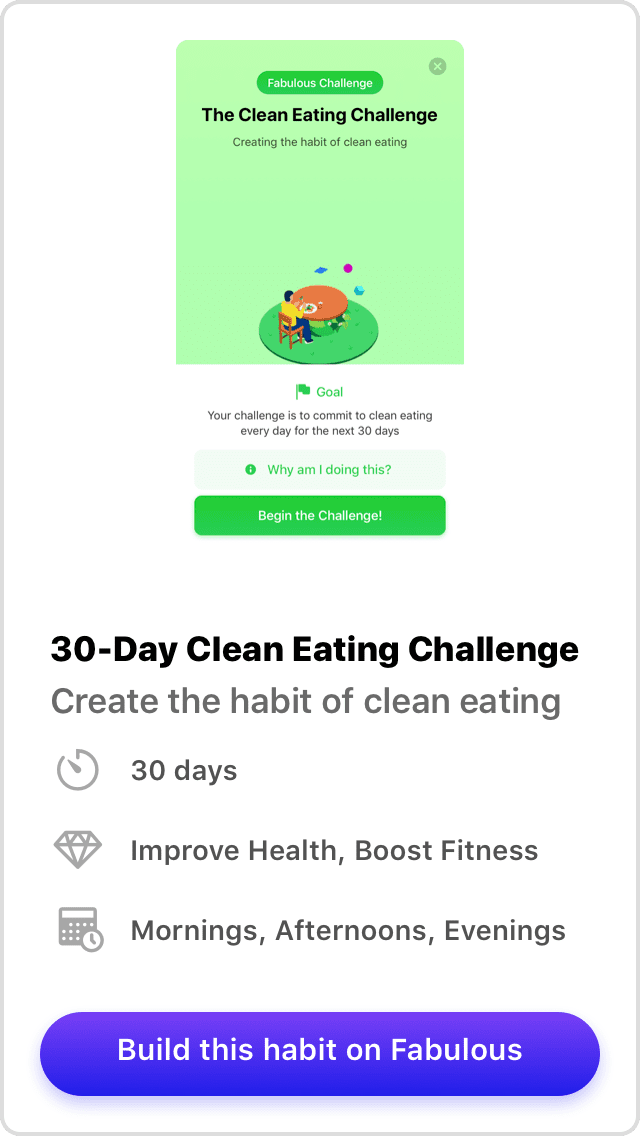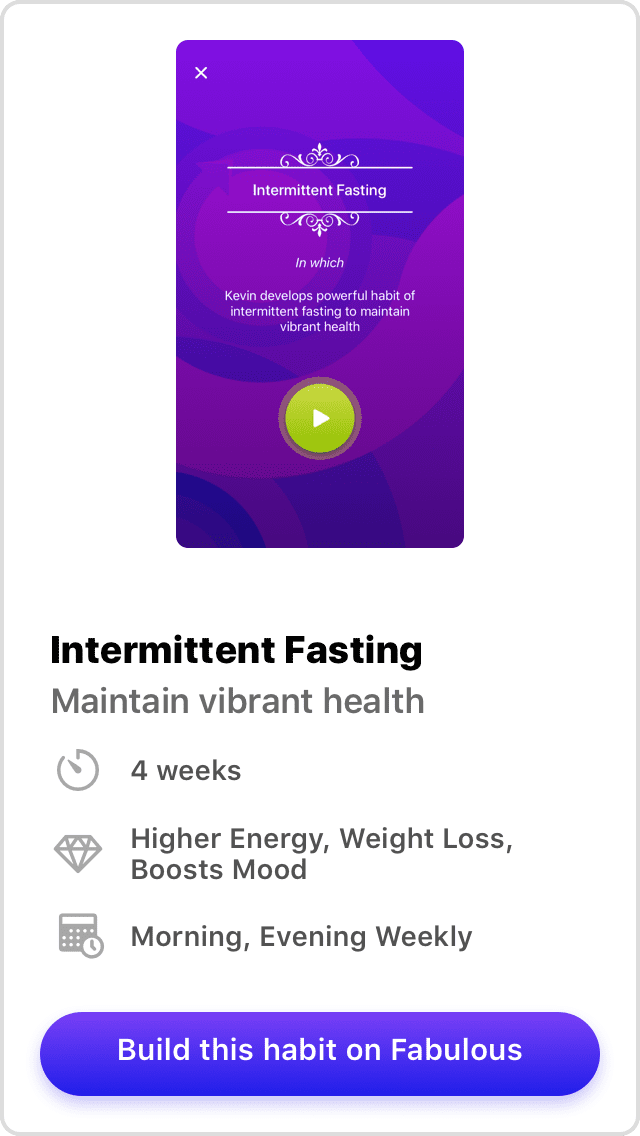There’s a lot of talk out there about what we should be eating. We’ve covered the building blocks of a healthy diet multiple times on this blog, but we’re just one voice in a massive chorus of doctors, magazines, and organizations telling you what you should be–or should not be–eating.
It’s true that what you eat matters. But did you know that when you eat could be just as important to your overall health? In What to Eat When, authors Michael F. Roizen, M.D., Michael Crupain, M.D., M.P.H, and Ted Spiker explain the importance of how we time our meals, using the latest dietary science. As it turns out, when we eat can be just as influential on our health as what we eat, if not more so.
Fabulous has a journey dedicated to eating well. Download the app and start the Celebrating Healthy Eating journey today!
What to Eat
Of course, that doesn’t mean you can subsist on pizza and ice cream as long as you time your meals carefully. What you eat is still important! It may be tempting to think that calorie restriction is the secret to a good diet, the reality is far more complicated than that. It’s true that the amount of calories you consume relative to the amount you burn is an important part of weight management, but there are other things to consider when planning your meals.
The simplest way to gauge the health of a food is to examine its macronutrients. Macronutrients are the primary building blocks we need from food to have a healthy and happy body. There are three: Carbohydrates, proteins, and fats.
You need all three macronutrients, or macros, for your body to function at its best, no matter what any fad diet tells you. Carbohydrates are your body’s primary energy source. Proteins contain vital amino acids that your cells need to be healthy. Fat insulates your body, cushions your organs, and is also your body’s way of storing excess energy from food. All three macronutrients have a vital role to play in our health.
However, of the three, protein appears to be the macro that keeps us feeling full the longest. But simple carbohydrates, like sugar and refined flour, and saturated fats, like butter, can actually make us feel hungrier than we really are.
Need a dietary makeover? Sign up for Fabulous’s 30-Day Clean Eating Challenge.
When to Eat it
Did you know your body becomes more resistant to insulin as the day goes on? There is a growing body of evidence to suggest that we burn more calories during the day than we do at night, regardless of our activity level. This makes sense from an evolutionary perspective; without candles or lamps, our ancient ancestors had to reserve their activities to the daylight hours. In fact, your eating and sleeping cycles are both controlled by your circadian rhythm.
What does this mean for us? It means that the more food you consume later in the day, the longer it takes for your body to burn it off, even if you’re active. Whatever you don’t burn off, your body stores as fat. When we first evolved, this was a great system for keeping us alive when food was scarse. But in our modern world of abundant food and sedentary lifestyles, it’s extremely easy to build up a surplus of excess body fat, which can contribute to or worsen medical problems like heart disease, diabetes, and arthritis.
Armed with this knowledge, you can make some relatively simple changes to your daily dietary habits that can have significant, positive effects on your body. These include:
Eating the bulk of your calories in the morning. You might have heard the turn of phrase, “Eat breakfast like a king, lunch like a prince, and dinner like a pauper.” It turns out, the science backs this up. Front-loading your calorie intake gives your body more time to burn off any excess glucose before it can be stored as fat.
Restricting your eating to daylight hours.
Not only does restricting your eating window help prevent you from overindulging, studies have shown that mice who eat within an eight-hour time frame are less likely to have metabolic issues as mice who consume the same number of calories without a time restriction.
Revamping your idea of a healthy breakfast.
Since you should be eating most of your calories first thing in the morning, but you also want to avoid simple carbohydrates and saturated fats, you may find yourself floundering about what to eat for breakfast. The solution to this is simple, though admittedly not obvious; don’t restrict yourself to traditional breakfast food! Grilled chicken and broccoli is just as delicious in the morning as it would be at night. There is no law that says you have to eat breakfast food and only breakfast food at breakfast.
Transitioning away from nighttime eating might be a challenge if it’s a deeply-ingrained habit for you. Don’t be afraid to start small; try saving parts of your dinner for breakfast the next morning. Eat more mindfully, and be fully aware of what you’re eating and what could be swapped out for healthier options. Find ways to make healthy eating work for your particular lifestyle. And, finally, don’t be too hard on yourself. You’re perfectly allowed to indulge in less-than-healthy foods whenever you like. Just don’t make it a habit!
Did you know Fabulous has an Intermittent Fasting journey? Sign up for it today to learn more about the health benefits of restricted eating times.






